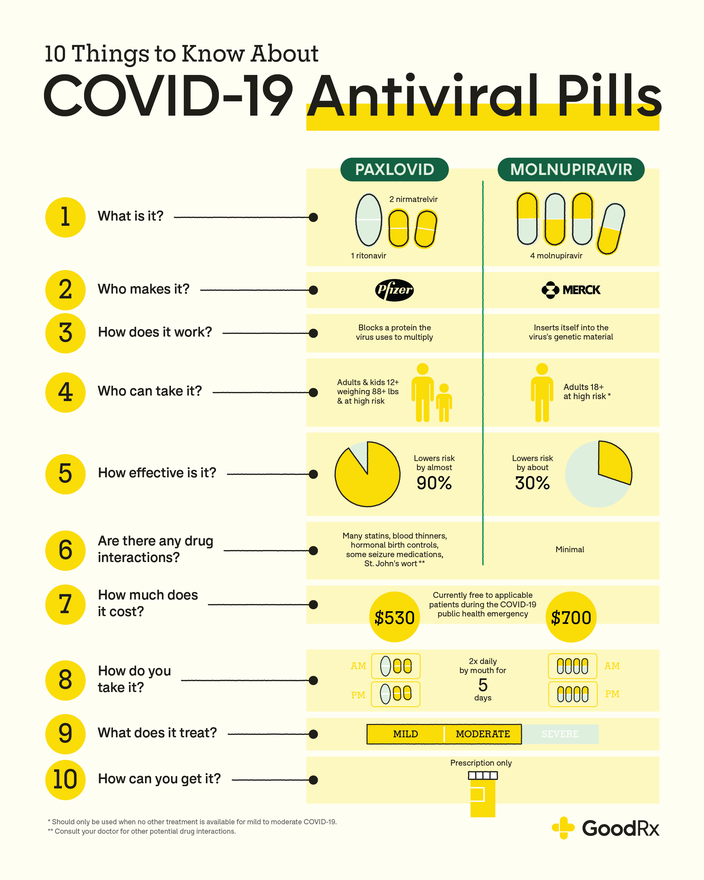Is Paxlovid Still Effective Against New COVID Variants?
Fast Facts:
- Paxlovid, an antiviral therapy for COVID-19, remains effective in preventing severe illness from some Omicron variants.
- The drug works differently from vaccines and monoclonal antibody treatments by targeting a different part of the virus, called proteases.
- Despite the drug's effectiveness, uptake remains low in the U.S. partially out of fears for Paxlovid 'rebound.'
As new COVID variants have emerged, they've not only gained the ability to evade vaccines more easily, but they've also rendered monoclonal antibody treatments—our first efforts to protect against the virus—unhelpful.1
The antiviral therapy Paxlovid, however, is still effective in preventing severe illness from COVID-19—even when faced with some Omicron variants.

The news comes from a December 2022 study published in the Annals of Internal Medicine and funded by the National Institutes of Health.2 Because Paxlovid went through clinical trials in 2021, when the Delta variant was dominant, researchers wanted to know how the drug would hold up against Omicron variants.
For the study, a team of researchers from Brigham & Women's Hospital examined the medical records of nearly 45,000 people over the age of 50 diagnosed with COVID during the first six months of 2022, when multiple Omicron subvariants were circulating.
Researchers identified about 12,500 patients who received a prescription for Paxlovid, and more than 32,000 patients who did not. Though hospitalization rates were low overall, people who received a Paxlovid prescription were 44% less likely to be hospitalized or die from COVID-19, compared to those who did not; unvaccinated people who received a prescription had an 81% lower risk of hospitalization or death.
“All data to date shows the active drug in Paxlovid, nirmatrelvir, remains effective,” Michael Mina, MD, PhD, an immunologist and chief science officer of eMed, who was not involved in the study, told Health.
Although the new research did not look at how Paxlovid works on current circulating subvariants—including XBB.1.5 and BQ.1.1—there is still reason to believe that the drug is still effective, even with newer Omicron subvariants.
Paxlovid's Power Lies in What It Targets
The mutations we've seen in SARS-CoV-2 so far have mostly been in the virus's spike protein, which is found on the surface of the virus, according to Dr. Mina. The spike protein allow the virus to enter healthy cells, and thus is the first step to infection.
It's for this reason that the vaccines and monoclonal antibody products also target the spike protein. In doing that, they can effectively reduce the chance of infection or severe illness from the disease—but that also prompts the virus to mutate, in order for it to keep spreading.
Paxlovid works differently. Instead of targeting the virus' spike protein, it instead targets the virus' proteases, which allow it to replicate. By targeting that part of the virus, Paxlovid effectively blocks the virus from replicating. So far, those proteases have not been under the same pressure to evolve and have not mutated, said Dr. Mina.
Sequencing information from some of the more recent Omicron subvariants, XBB and BQ.1, also showed mutations in the parts of the virus not targeted by Paxlovid, according to NIH study co-author Scott Dryden-Peterson, MD, medical director of COVID outpatient therapy at Mass General Brigham.
While it's possible that future variants could contain mutations in the proteases, it would likely come at a cost to the virus, such as making it less contagious, said Dr. Mina, who added that we are still far from that scenario.
Drug Still Not Being Used by All Who Could Benefit
Although Paxlovid remains effective at curbing severe COVID, “The majority of people who could benefit aren’t taking it,” said Dryden-Peterson.
According to an article in Nature, about 10 million courses of Paxlovid have been delivered to the United States; only about 6.7 million have been used.3
Part of the lag in uptake from both patients and providers is due to misinformation surrounding the drug—primarily due to fear of Paxlovid 'rebound,' or a recurrence in COVID symptoms after a course of the drug has been completed.
Although preliminary research has shown that incidences of both viral rebound and symptom rebound were higher in people who took Paxlovid—about 5% and 12% higher, respectively—rebound still occurred in people who did not take any treatment at all.
“Rebound happens in both those who do and those who do not take Paxlovid, it’s just more highly recognized in those who take Paxlovid because people are thinking about it,” said Dr. Mina. “Overall, we believe that the rates are not too different and that Paxlovid is not greatly increasing risk of rebound. When rebound does occur after Paxlovid it is rarely, if ever, serious.”
For those who are at high-risk for severe disease from COVID, there isn't a reason not to take Paxlovid, and the risk of rebound should not be a deterrent, said Dr. Dryden-Peterson.
“Those rebounds are mild, though they are inconvenient," said Dr. Dryden-Peterson. "But for the majority of people it’s worth it because Paxlovid drastically reduces the severity of COVID."
Dr. Dryden-Peterson also emphasized the importance of early detection—not only in order to receive Paxlovid in time for it to work, but to avoid hospitalization.
"The majority of people who are getting admitted with COVID don’t know they have it before they’re admitted with severe illness,” he said, adding that only about 40% of people in the NIH study knew they had COVID before coming to the hospital.
Testing yourself for COVID if you’re feeling sick at all is key, he said. Keeping at-home tests on hand and reaching out to your doctor if you test positive can keep high-risk people from being hospitalized for severe illness.
SOURCES

.png)


.png)

.png)


Comments